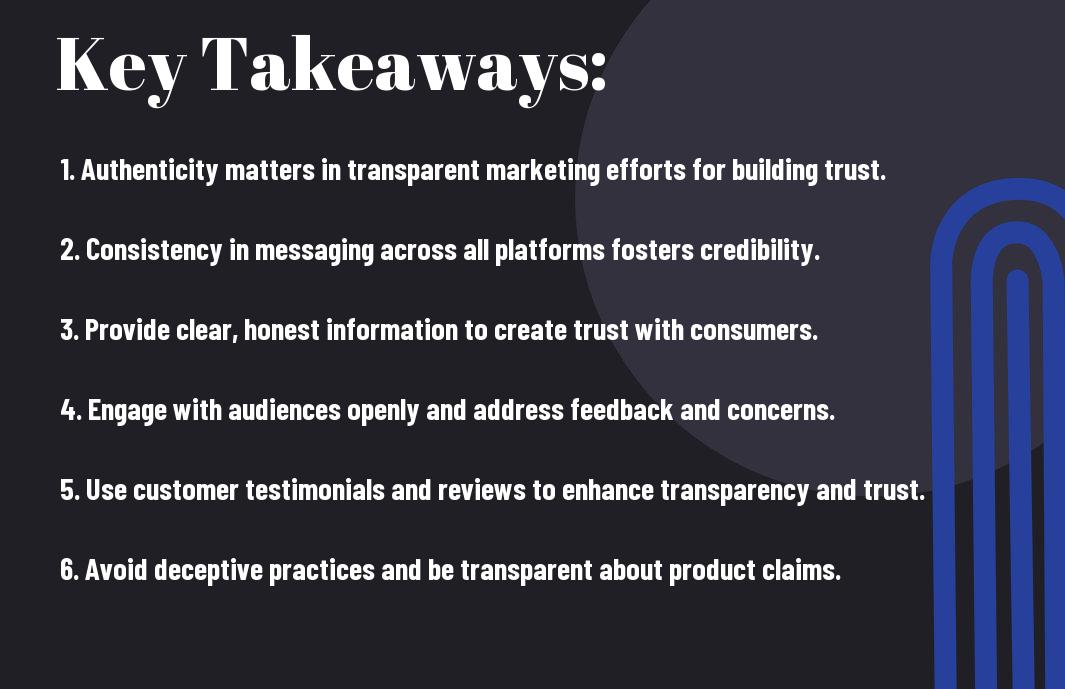Transparent marketing is the key to establishing trust with your audience. In today’s competitive landscape, building trust through transparency can set you apart. Dive into the world of transparent marketing with our guide on 17 Tips To Create A Transparent Marketing Strategy and learn how to earn credibility, loyalty, and long-term relationships with your customers.
Key Takeaways:
- Establishing authenticity: Transparency in marketing builds trust by showcasing real people, real stories, and genuine interactions with customers.
- Creating clear communication: Clearly communicating pricing, policies, and values helps in fostering trust with consumers and setting realistic expectations.
- Engaging in open dialogue: Encouraging feedback, responding promptly to questions and concerns, and being open about successes and failures can help in maintaining trust with your audience.
The Importance of Transparency in Marketing
For How You Can Build Customer Trust With Transparency in Marketing, transparency is the cornerstone of a successful marketing strategy. When you are transparent in your marketing efforts, you are building a foundation of trust with your audience. This trust is necessary for establishing long-lasting relationships with your customers and fostering loyalty to your brand.
Why Consumers Are Skeptical of Marketing Messages
One reason consumers are often skeptical of marketing messages is due to the lack of transparency in advertising. Many companies use deceptive tactics to push their products or services, leading consumers to question the authenticity of the claims being made. When you are transparent in your marketing, you are providing honest and open communication with your audience, which helps to build credibility and trust.
The Consequences of Lack of Transparency
Marketing that lacks transparency can have severe consequences for your brand. When consumers feel misled or deceived by marketing messages, they are likely to lose trust in your brand and may even spread negative word-of-mouth reviews. This can damage your reputation and ultimately lead to a loss of customers. On the other hand, companies that prioritize transparency in their marketing efforts are more likely to build strong relationships with their audience, leading to increased customer loyalty and satisfaction.


Defining Transparent Marketing
What Is Transparent Marketing?
Marketing transparency is all about being open, honest, and clear in your marketing communications with your audience. It involves sharing information about your products, services, and business practices in a way that builds trust with your customers. By being transparent, you are showing your audience that you have nothing to hide and that you value their trust above all else.
Key Characteristics of Transparent Marketing
On the one hand, transparent marketing involves providing accurate and truthful information about your products or services. It means not exaggerating or making false claims just to make a sale. On the other hand, transparent marketing also means being open about any shortcomings or limitations of what you’re offering. This helps set realistic expectations for your customers and avoids any potential disappointment or backlash down the line.
Benefits of Transparent Marketing
Increased Customer Trust and Loyalty
All successful marketing strategies are built on trust, and transparency is key to establishing that trust with your audience. When you are open and honest about your products, services, and pricing, customers are more likely to trust you. This trust leads to increased loyalty as customers feel confident in their decision to choose your brand over competitors.
Improved Brand Reputation
Improved brand reputation is another key benefit of transparent marketing. When you are open about your processes, values, and customer interactions, you build a positive reputation in the eyes of your audience. For instance, if you are honest about any mistakes or setbacks, customers are more likely to forgive and trust that you will make things right.
Better Customer Insights and Feedback
Improved customer insights and feedback are important for refining your marketing strategies and meeting the needs of your target audience effectively. When you are transparent in your communications, customers feel valued and are more likely to provide honest feedback. This feedback can help you make data-driven decisions and tailor your offerings to better suit your customers’ preferences.
Benefits: Transparent marketing not only builds trust and loyalty with your customers but also enhances your brand reputation and provides valuable insights to improve your marketing strategies. By being open and honest in your communications, you can establish a strong connection with your audience and foster long-term relationships based on trust and mutual respect.
Strategies for Implementing Transparent Marketing
Now, let’s probe some effective strategies for implementing transparent marketing in your business. Transparency is key to building trust with your audience and creating long-lasting relationships. By being open and honest in your marketing efforts, you can establish credibility and authenticity that resonates with consumers.
Be Honest and Authentic in Your Messaging
Honest: One of the most crucial aspects of transparent marketing is being honest and authentic in your messaging. Avoid exaggerations or false promises in your content and communications. Be genuine in your approach and strive to build a connection based on trust and mutual respect.
Provide Clear and Concise Information
The: When implementing transparent marketing, it’s imperative to provide clear and concise information to your audience. Ensure that your messaging is straightforward and easy to understand, avoiding jargon or confusing language. Clear and concise information helps establish credibility and builds trust with your audience.
Implementing a straightforward communication style can enhance customer understanding and lead to increased engagement and conversions. Be transparent about your products or services, pricing, and any relevant policies to ensure customers feel informed and empowered to make purchasing decisions confidently.
Use Social Proof and Customer Testimonials
Customer: Utilizing social proof and customer testimonials is a powerful way to demonstrate transparency and build credibility with your audience. Share real customer experiences and feedback to showcase the value of your products or services. By leveraging social proof, you can create trust and confidence in your brand among potential customers.
Plus, featuring testimonials prominently on your website and marketing materials can humanize your brand and provide reassurance to new customers. Encourage satisfied customers to share their experiences and reviews to establish a positive reputation and foster a transparent relationship with your audience.
Be Transparent About Your Business Practices
Transparent: Being transparent about your business practices is imperative for building trust and credibility with your audience. Provide clear information about your company’s values, mission, and operational processes to showcase your commitment to honesty and integrity.
Proof of ethical business practices, such as sustainable sourcing or charitable initiatives, can resonate positively with consumers and differentiate your brand in a competitive market. By openly sharing your business practices, you invite customers to connect with your values and become loyal supporters of your brand.
Overcoming Common Obstacles to Transparency
Fear of Vulnerability and Perfectionism
Perfectionism can be a significant obstacle when striving for transparency in your marketing efforts. You may fear that exposing any flaws or mistakes could damage your brand’s reputation. However, embracing vulnerability can actually strengthen your connection with your audience. By showing that you are human and willing to admit when things aren’t perfect, you build trust with your customers and demonstrate authenticity.
Concerns About Competitor Advantage
Obstacles may arise when you worry that being transparent about your processes or pricing could give your competitors an advantage. However, transparency can also set you apart from competitors and build credibility with your audience. If you openly share information and demonstrate honesty, customers are more likely to choose your brand over competitors who may not be as forthcoming.
The concern about giving competitors an edge is valid, but transparency shows a commitment to integrity and can actually attract more customers who value honesty and authenticity in a brand.
Difficulty in Measuring Transparency’s ROI
Advantage
Measuring the return on investment (ROI) of transparency in your marketing strategies can be challenging. However, tracking customer trust levels, feedback on your transparent initiatives, and customer loyalty can provide insights into the impact of transparency on your business. While it may not be as straightforward as tracking sales numbers, understanding the long-term benefits of transparency can help you justify the investment of time and resources.
This approach allows you to gather qualitative data that may not be as easily quantifiable but is necessary in understanding the emotional connection and loyalty that transparency can cultivate among your audience.
Measuring the Success of Transparent Marketing
Tracking Key Performance Indicators (KPIs)
After implementing transparent marketing strategies, it’s imperative to track your progress using Key Performance Indicators (KPIs). **KPIs provide quantifiable data that can help you gauge the effectiveness of your transparent marketing efforts. By monitoring metrics such as website traffic, conversion rates, customer engagement, and brand sentiment, you can ** gauge the impact of your transparency initiatives and make informed decisions about future strategies.
Conducting Regular Customer Feedback Surveys
Regular customer feedback surveys are a valuable tool for **measuring the success of your transparent marketing efforts. By collecting feedback directly from your customers, you can ** gain valuable insights into how they perceive your brand’s transparency and trustworthiness. This information can help you identify areas for improvement and make necessary adjustments to enhance customer trust.
The feedback collected from these surveys can also ** provide you with actionable data that can guide your future marketing strategies and help you build stronger relationships with your customers. Implementing changes based on customer feedback demonstrates your commitment to transparency and can ** further enhance trust and loyalty among your target audience.
Monitoring Online Reviews and Ratings
Marketing your brand transparently also involves monitoring online reviews and ratings. **It’s crucial to keep an eye on ** what customers are saying about your brand on review platforms and social media. Positive reviews can ** reinforce the trustworthiness of your brand, while negative reviews present an opportunity to address concerns publicly and showcase your commitment to transparency and customer satisfaction.
Regularly ** monitoring online reviews and ratings allows you to stay proactive in managing your brand’s reputation and ** address any issues that may arise promptly. Engaging with customers who leave reviews, whether positive or negative, demonstrates your dedication to transparency and customer care.
To wrap up
With this in mind, building trust with transparent marketing is necessary for businesses looking to connect with their audience in a genuine way. By being honest, providing value, and communicating openly, you can establish a solid foundation of trust that will benefit your brand in the long run. Remember to always prioritize your customers’ needs and concerns, and be transparent in your messaging to build credibility and loyalty.